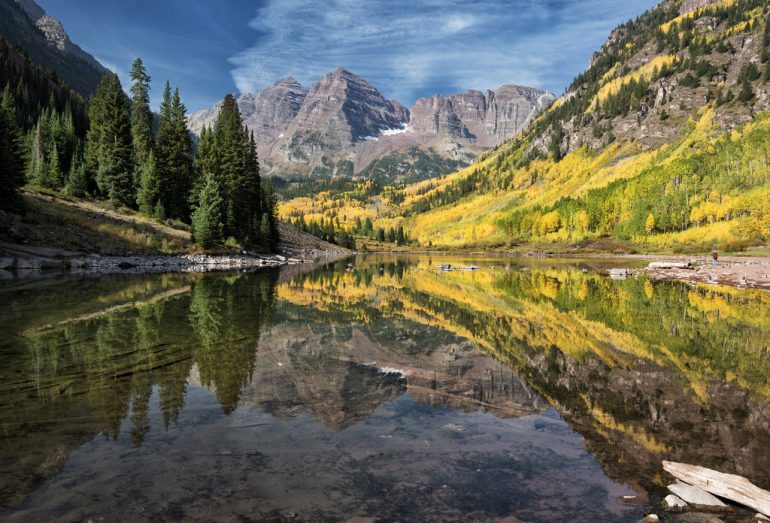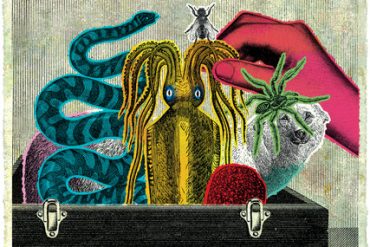I have been thinking lately of going feral.
Once or twice each season I briefly leave the comforts of my home in the front country of Yosemite National Park in order to spend several nights in the solitude of the Sierra Nevada wilderness. With each excursion I become more tempted to stay out there. I would wander farther and farther from the trail, abandoning my tent to sleep under the stars, waking at sunrise with wild, tangled hair, soaking with dew. Why couldn’t I learn to live on grasses and berries and grubs, the change of the seasons, and the occasional trout? Creatures far more powerful than humans live on these and nothing more.
I have yet to take the plunge. Once wild, there is no going back.
And apparently it works both ways; you don’t come back from being tamed, any more than you come back from going feral. I learned this when I woke up one night to find that a bear had ransacked my kitchen cupboards, looking for chocolate.
It was late, around midnight, when I awoke to the sound of banging and clattering in the house. I assumed that it was my noisy housemate Amanda, drunk or high again after another night of partying. When the commotion didn’t subside, I rolled groggily and irritably out of bed to remind this feckless housemate of mine that some of us had to be at work early the next morning. But I didn’t find my housemate in the kitchen—I found chaos. There was trash everywhere, shreds of plastic and cardboard packaging strewn all over. In the middle of the kitchen floor was a lake of chocolate milk. A can of chocolate frosting had been ripped apart and licked clean, and a chocolate chip bag lay mangled and empty on the floor along with an empty package of chocolate cookies. Across the kitchen, the screen door was in tatters.
Then I saw Amanda. She was pacing back and forth on the porch, shaking all the keys on her key ring. My only thought, which surfaced through a thick fog of sleep, was, What kind of Satanic ritual has just happened here?
“Amanda!” I hollered, staggering through what had been our screen door. “What the hell is going on?”
“There was a bear!” said Amanda, still breathless.
“No,” I said flatly. “We don’t have bears in Wawona.”
Amanda whipped out her phone and pulled up a photo of a giant, cinnamon-red bear butt exiting our house through the self-same shredded screen door I had just come through. I examined it in silence.
“How…?” I asked finally.
“I was doing laundry,” said Amanda. “And the bear was going out that side door as I was coming in the front door. Now I’m making noise so he doesn’t come back.”
Questions floated through my head one after another: Why was Amanda doing laundry at midnight? How was there a bear in our house, if we didn’t have bears here? How did it get in?
Answers came to me slowly, in succession: First: there was never going to be an explanation for Amanda’s habits. And then: I had left the sliding glass door open that night to let in the cool air, leaving nothing but a flimsy screen between my kitchen and the wildlife. And finally: Oh my word, there are bears here!
I, of all people—a park ranger—should have known better. Of
Tamed is the shorter way of saying “no fear of humans.” Bears, when exposed to the human way of life, have a tendency to want what we have: a quick fix, an easy subsistence. The quick fix—packaged food—is at least as bad for the bear as it is for the human, but more addicting for the bear. Once a bear has a taste for human food, he will stop at almost nothing to get it, unhesitatingly shredding screens and coming right into houses, peeling the doors off of cars to get at coolers, gorging on the synthetic stuff we call food until his teeth rot and fall out and he starves to death, or until he is found breaking and entering into one too many houses, getting a little too brazen, and is euthanized. Such are the dangers of being tamed.
I called the park dispatcher to notify her of the break-in. By the time I got to work the next morning, with craterous dark circles under my eyes, the bear had broken into three more houses. He was a wanted animal now. A team of bear biologists came and set traps out all over the area. The following night I sat outside on my porch, reading a book. I paused to turn the page and was abruptly aware, as I have never been before or since, of another’s presence. I looked around, knowing already what I would find. Sure enough: there, two feet off, was the bear—my kitchen bear. He sat back on his haunches, remarkably dog-like, and regarded me knowingly. My breath drained out of my chest and I tumbled into those endless black eyes of his and could not move or make a sound or blink, and I didn’t want to. I was his, willingly skewered by his gaze. We might have sat there, frozen, engrossed, for hours, had I not found myself needing to inhale. The tableau cracked when I breathed in, and instinct filled my lungs and animated me, and I waved my arms and shouted, “Get out of here, bear!” and then looked away from those liquid eyes, ashamed for scaring him off as I had been trained to do, ashamed at my need to breathe, at my humanness, at my stupidity in leaving the door open the night before. The bear shambled off down the
They caught him eventually, of course. They
A few months after the break-in I went for an evening run around the meadow. I rounded a bend in the trail and heard an audacious crashing sound, the kind of sound only made by creatures at the top of the food chain, creatures with no need for fear. I came to a screeching halt just in time to see a giant, cinnamon red bear lumber across the trail in front of me and then go thundering into the underbrush along the edge of the meadow, twigs snapping like gunshots as he went. I watched as he tore into a fallen log, shredding off long strips of bark in search of grubs, sending wood chips flying.
This was not my bear. This was no one’s bear—he was a wild creature. He knew I was there. He must have; bears have a sense of smell nearly seven times greater than that of a bloodhound, and I, sweating and jogging, was putting off perhaps more scent than usual. But this bear didn’t care. This bear didn’t want me, didn’t want the chocolate in my house. He had absolutely no use for me. He had grubs on his mind.
Standing there, statue-like, I weighed the option before me. Why couldn’t I follow him, disappear into the woods, root through logs, graze on grasses? Who needs roofs, hot meals, baths? Who needs language or human company? I took a step toward him. He looked up, startled, having apparently forgotten I was there. He retreated and let out a warning grunt. So this was his answer: Get out of here, human! I could not argue. I heaved a sigh and turned down the trail. When I passed by the meadow again, the bear was gone, having disappeared into the wilderness to carry out his unknowable, wild





